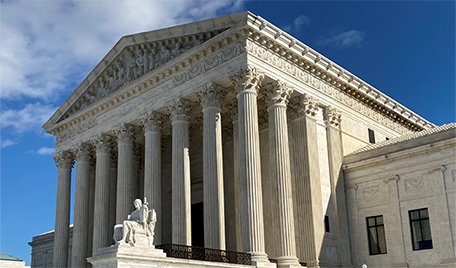In a unanimous ruling last Thursday, the Supreme Court struck down a Wisconsin Supreme Court decision denying unemployment tax exemptions to a faith-based group because the charity provided help to people of other faiths.
 The closely watched case, Catholic Charities Bureau v. Wisconsin Labor & Industry Review Commission, involved a Wisconsin state law that exempted unemployment compensation taxes paid by nonprofit organizations “operated primarily for religious purposes” and “operated, supervised, controlled, or principally supported by a church or convention or association of churches.” Catholic Charities Bureau, Inc., and several of its subsidiaries sought this exemption as organizations controlled by the Roman Catholic Diocese in Wisconsin.
The closely watched case, Catholic Charities Bureau v. Wisconsin Labor & Industry Review Commission, involved a Wisconsin state law that exempted unemployment compensation taxes paid by nonprofit organizations “operated primarily for religious purposes” and “operated, supervised, controlled, or principally supported by a church or convention or association of churches.” Catholic Charities Bureau, Inc., and several of its subsidiaries sought this exemption as organizations controlled by the Roman Catholic Diocese in Wisconsin.
The Wisconsin Supreme Court, however, had found that because Catholic Charities provided charitable benefits to all people; employed non-Catholics in the process; and did not proselytize people it served, it was ineligible for the tax exemption.
On appeal, the U.S. Supreme Court disagreed: “The Wisconsin Supreme Court’s application of §108.02(15)(h)(2) to petitioners violates the First Amendment,” said Justice Sonia Sotomayor, writing for the full Court. “Petitioners’ eligibility for the exemption ultimately turns on inherently religious choices (namely, whether to proselytize or serve only co-religionists in the course of charitable work), not ‘secular criteria’ that ‘happen to have a ‘disparate impact’ upon different religious organizations,” Sotomayor wrote. “Because that regime explicitly differentiates between religions based on theological practices, strict scrutiny applies.”
Strict scrutiny is a test the Court applies to First Amendment cases in which the government must prove a law is closely tailored to advance a compelling governmental interest and it is the least restrictive way of serving that interest.
The state had cited a Supreme Court precedent in Gillette v. United States (1971), which found the First Amendment’s Establishment Clause was not violated when a religious conscientious objector challenged the draft based on specific opposition to the Vietnam War.
In Gillette, the Court found that the Military Selective Service Act of 1967—which provided that no person shall be subject to “service in the armed forces of the United States who, by reason of religious training and belief, is conscientiously opposed to participation in war in any form”—was constitutional and could be applied to prevent someone who only had opposition to a particular war from claiming conscientious objector status. The Wisconsin Supreme Court interpreted this precedent to mean that whenever a religious “accommodation’s line serves ‘considerations of a pragmatic nature’ having ‘nothing to do with a design to foster or favor any sect, religion, or cluster of religions,’ the Establishment Clause is not offended.”
The U.S. Supreme Court, however, held the Gillette case was not relevant in this situation because conscientious objector status for opposition to all wars was equally available to members of all religions and applied to all, and the exemption “focused on individual conscientious belief, not on sectarian affiliation.”
“After all, an exemption provided [in Wisconsin] only to organizations that engage in proselytization or serve only co-religionists is not, on its face, ‘available on an equal basis’ to all denominations. That type of explicit’ distinction between religious practices is what this Court has deemed subject to strict scrutiny, including in the context of religious exemptions,” Sotomayor noted in her majority opinion.
“When the government distinguishes among religions based on theological differences in their provision of services, it imposes a denominational preference that must satisfy the highest level of judicial scrutiny. Because Wisconsin has transgressed that principle without the tailoring necessary to survive such scrutiny, the judgment of the Wisconsin Supreme Court is reversed,” Sotomayor concluded.
In a concurring opinion, Justice Clarence Thomas wrote that Catholic Charities and its subentities suffered “unconstitutional religious discrimination” under the “church authority doctrine” which forbids civil courts from exercising jurisdiction over “subject-matter[s]” that are “ecclesiastical in its character.”
And in a second concurring opinion, Justice Ketanji Brown Jackson said that the Wisconsin Supreme Court “has created a constitutional problem: The State treats church-affiliated charities that proselytize and serve co-religionists exclusively differently from those that do not. Because I agree that this distinction violates the neutrality principle of the Constitution’s Religion Clauses, I join the Court’s opinion in full.”
Scott Bomboy is the editor in chief of the National Constitution Center.







